Entrepreneurship and Small Business Management
VerifiedAdded on 2020/02/12
|9
|2338
|192
Report
AI Summary
This report delves into the characteristics, skills, and motivations essential for successful entrepreneurship. It discusses the influence of background and experience on entrepreneurial traits, emphasizing the importance of determination, risk-taking, and adaptability. The report also highlights the role of education and family support in fostering entrepreneurial qualities, ultimately contributing to business success and economic development.

ENTREPRENEURSHIP
AND SMALL BUSINESS
MANAGEMENT
AND SMALL BUSINESS
MANAGEMENT
Paraphrase This Document
Need a fresh take? Get an instant paraphrase of this document with our AI Paraphraser
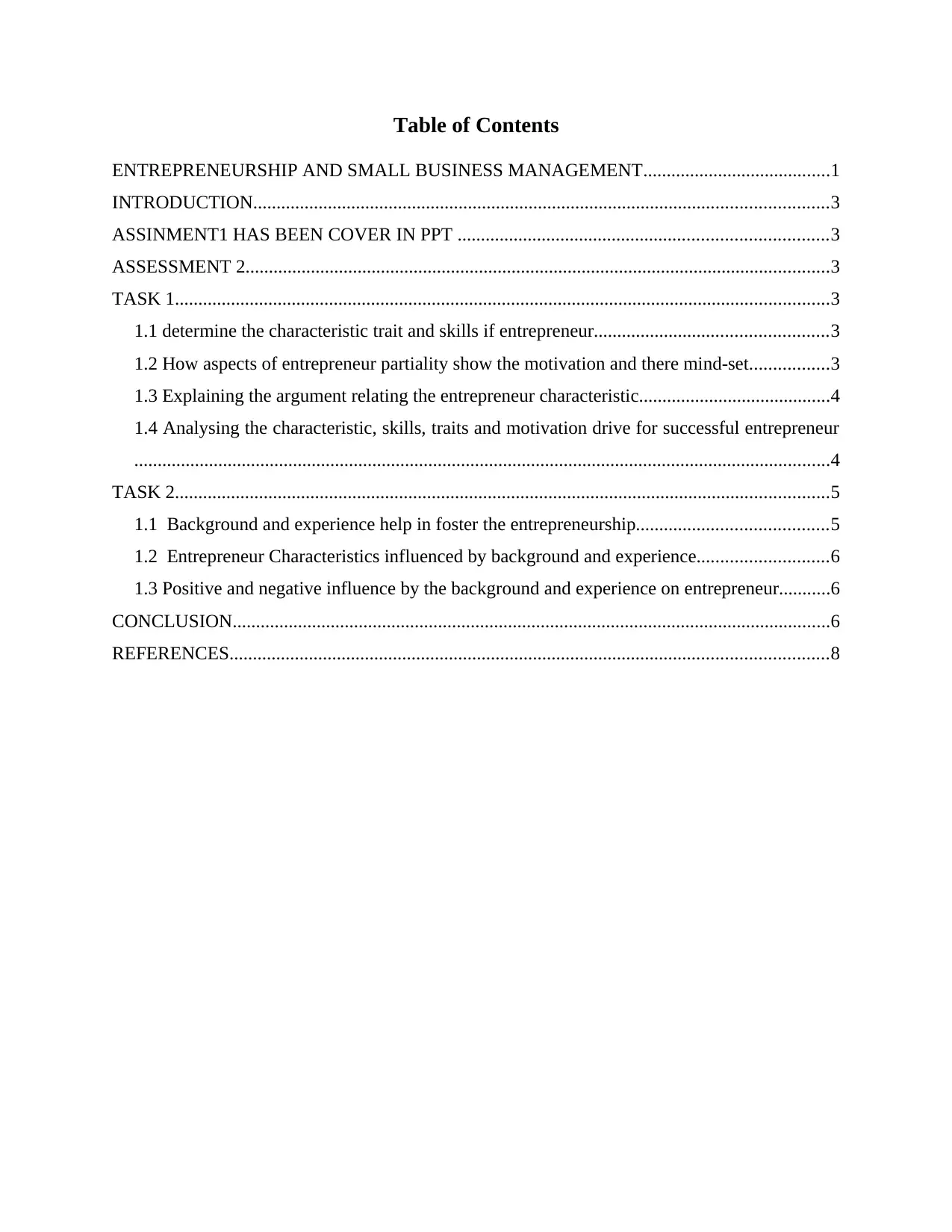
Table of Contents
ENTREPRENEURSHIP AND SMALL BUSINESS MANAGEMENT........................................1
INTRODUCTION...........................................................................................................................3
ASSINMENT1 HAS BEEN COVER IN PPT ...............................................................................3
ASSESSMENT 2.............................................................................................................................3
TASK 1............................................................................................................................................3
1.1 determine the characteristic trait and skills if entrepreneur..................................................3
1.2 How aspects of entrepreneur partiality show the motivation and there mind-set.................3
1.3 Explaining the argument relating the entrepreneur characteristic.........................................4
1.4 Analysing the characteristic, skills, traits and motivation drive for successful entrepreneur
.....................................................................................................................................................4
TASK 2............................................................................................................................................5
1.1 Background and experience help in foster the entrepreneurship.........................................5
1.2 Entrepreneur Characteristics influenced by background and experience............................6
1.3 Positive and negative influence by the background and experience on entrepreneur...........6
CONCLUSION................................................................................................................................6
REFERENCES................................................................................................................................8
ENTREPRENEURSHIP AND SMALL BUSINESS MANAGEMENT........................................1
INTRODUCTION...........................................................................................................................3
ASSINMENT1 HAS BEEN COVER IN PPT ...............................................................................3
ASSESSMENT 2.............................................................................................................................3
TASK 1............................................................................................................................................3
1.1 determine the characteristic trait and skills if entrepreneur..................................................3
1.2 How aspects of entrepreneur partiality show the motivation and there mind-set.................3
1.3 Explaining the argument relating the entrepreneur characteristic.........................................4
1.4 Analysing the characteristic, skills, traits and motivation drive for successful entrepreneur
.....................................................................................................................................................4
TASK 2............................................................................................................................................5
1.1 Background and experience help in foster the entrepreneurship.........................................5
1.2 Entrepreneur Characteristics influenced by background and experience............................6
1.3 Positive and negative influence by the background and experience on entrepreneur...........6
CONCLUSION................................................................................................................................6
REFERENCES................................................................................................................................8
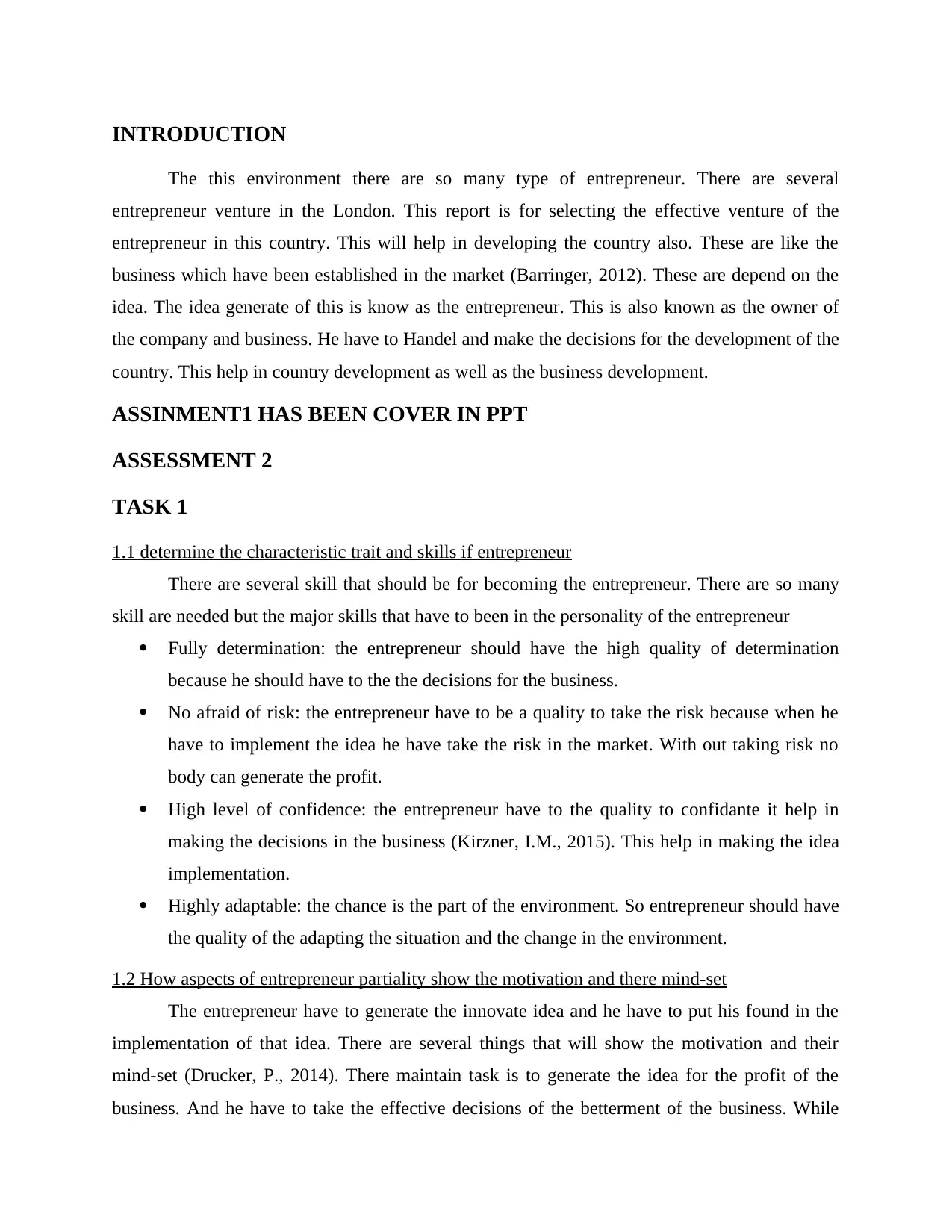
INTRODUCTION
The this environment there are so many type of entrepreneur. There are several
entrepreneur venture in the London. This report is for selecting the effective venture of the
entrepreneur in this country. This will help in developing the country also. These are like the
business which have been established in the market (Barringer, 2012). These are depend on the
idea. The idea generate of this is know as the entrepreneur. This is also known as the owner of
the company and business. He have to Handel and make the decisions for the development of the
country. This help in country development as well as the business development.
ASSINMENT1 HAS BEEN COVER IN PPT
ASSESSMENT 2
TASK 1
1.1 determine the characteristic trait and skills if entrepreneur
There are several skill that should be for becoming the entrepreneur. There are so many
skill are needed but the major skills that have to been in the personality of the entrepreneur
Fully determination: the entrepreneur should have the high quality of determination
because he should have to the the decisions for the business.
No afraid of risk: the entrepreneur have to be a quality to take the risk because when he
have to implement the idea he have take the risk in the market. With out taking risk no
body can generate the profit.
High level of confidence: the entrepreneur have to the quality to confidante it help in
making the decisions in the business (Kirzner, I.M., 2015). This help in making the idea
implementation.
Highly adaptable: the chance is the part of the environment. So entrepreneur should have
the quality of the adapting the situation and the change in the environment.
1.2 How aspects of entrepreneur partiality show the motivation and there mind-set
The entrepreneur have to generate the innovate idea and he have to put his found in the
implementation of that idea. There are several things that will show the motivation and their
mind-set (Drucker, P., 2014). There maintain task is to generate the idea for the profit of the
business. And he have to take the effective decisions of the betterment of the business. While
The this environment there are so many type of entrepreneur. There are several
entrepreneur venture in the London. This report is for selecting the effective venture of the
entrepreneur in this country. This will help in developing the country also. These are like the
business which have been established in the market (Barringer, 2012). These are depend on the
idea. The idea generate of this is know as the entrepreneur. This is also known as the owner of
the company and business. He have to Handel and make the decisions for the development of the
country. This help in country development as well as the business development.
ASSINMENT1 HAS BEEN COVER IN PPT
ASSESSMENT 2
TASK 1
1.1 determine the characteristic trait and skills if entrepreneur
There are several skill that should be for becoming the entrepreneur. There are so many
skill are needed but the major skills that have to been in the personality of the entrepreneur
Fully determination: the entrepreneur should have the high quality of determination
because he should have to the the decisions for the business.
No afraid of risk: the entrepreneur have to be a quality to take the risk because when he
have to implement the idea he have take the risk in the market. With out taking risk no
body can generate the profit.
High level of confidence: the entrepreneur have to the quality to confidante it help in
making the decisions in the business (Kirzner, I.M., 2015). This help in making the idea
implementation.
Highly adaptable: the chance is the part of the environment. So entrepreneur should have
the quality of the adapting the situation and the change in the environment.
1.2 How aspects of entrepreneur partiality show the motivation and there mind-set
The entrepreneur have to generate the innovate idea and he have to put his found in the
implementation of that idea. There are several things that will show the motivation and their
mind-set (Drucker, P., 2014). There maintain task is to generate the idea for the profit of the
business. And he have to take the effective decisions of the betterment of the business. While
⊘ This is a preview!⊘
Do you want full access?
Subscribe today to unlock all pages.

Trusted by 1+ million students worldwide
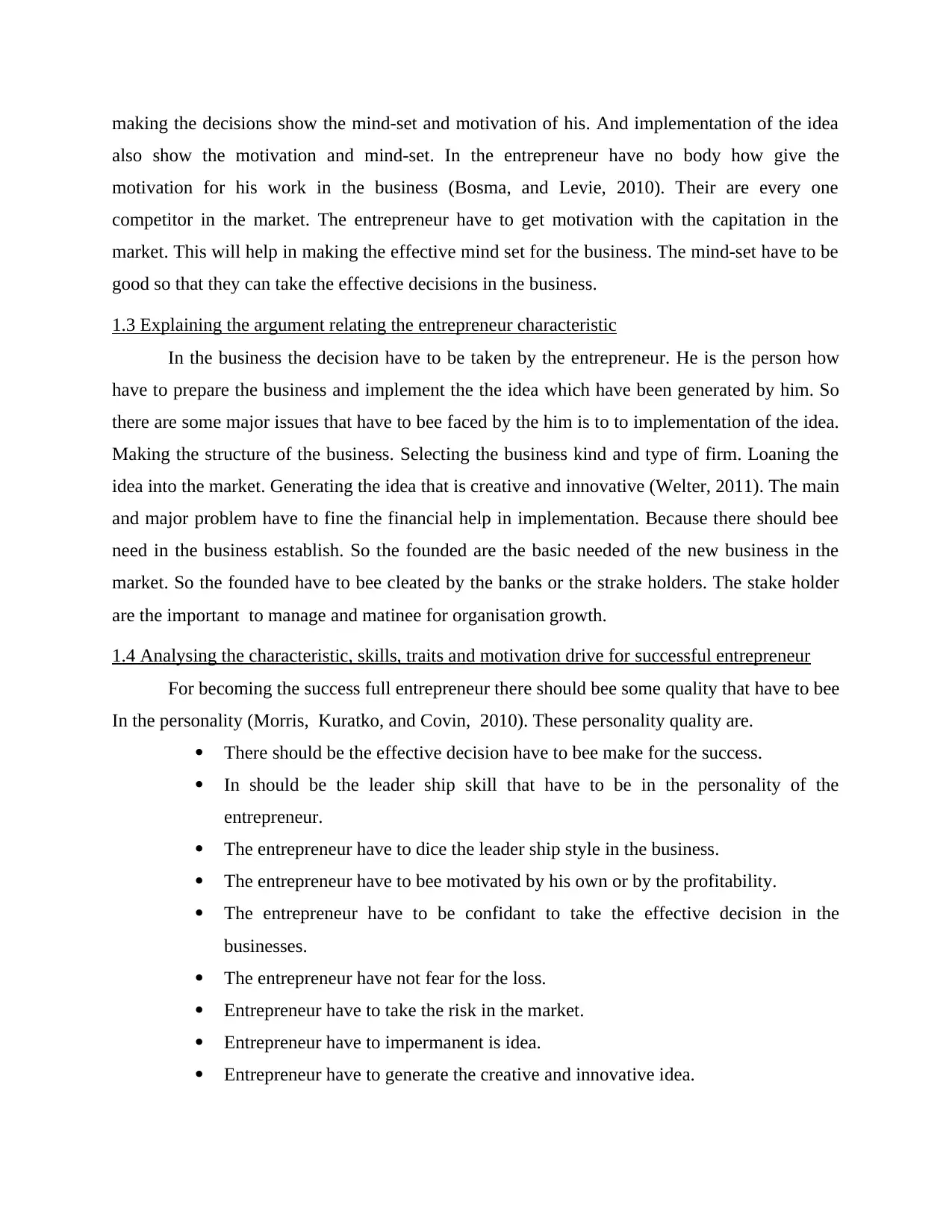
making the decisions show the mind-set and motivation of his. And implementation of the idea
also show the motivation and mind-set. In the entrepreneur have no body how give the
motivation for his work in the business (Bosma, and Levie, 2010). Their are every one
competitor in the market. The entrepreneur have to get motivation with the capitation in the
market. This will help in making the effective mind set for the business. The mind-set have to be
good so that they can take the effective decisions in the business.
1.3 Explaining the argument relating the entrepreneur characteristic
In the business the decision have to be taken by the entrepreneur. He is the person how
have to prepare the business and implement the the idea which have been generated by him. So
there are some major issues that have to bee faced by the him is to to implementation of the idea.
Making the structure of the business. Selecting the business kind and type of firm. Loaning the
idea into the market. Generating the idea that is creative and innovative (Welter, 2011). The main
and major problem have to fine the financial help in implementation. Because there should bee
need in the business establish. So the founded are the basic needed of the new business in the
market. So the founded have to bee cleated by the banks or the strake holders. The stake holder
are the important to manage and matinee for organisation growth.
1.4 Analysing the characteristic, skills, traits and motivation drive for successful entrepreneur
For becoming the success full entrepreneur there should bee some quality that have to bee
In the personality (Morris, Kuratko, and Covin, 2010). These personality quality are.
There should be the effective decision have to bee make for the success.
In should be the leader ship skill that have to be in the personality of the
entrepreneur.
The entrepreneur have to dice the leader ship style in the business.
The entrepreneur have to bee motivated by his own or by the profitability.
The entrepreneur have to be confidant to take the effective decision in the
businesses.
The entrepreneur have not fear for the loss.
Entrepreneur have to take the risk in the market.
Entrepreneur have to impermanent is idea.
Entrepreneur have to generate the creative and innovative idea.
also show the motivation and mind-set. In the entrepreneur have no body how give the
motivation for his work in the business (Bosma, and Levie, 2010). Their are every one
competitor in the market. The entrepreneur have to get motivation with the capitation in the
market. This will help in making the effective mind set for the business. The mind-set have to be
good so that they can take the effective decisions in the business.
1.3 Explaining the argument relating the entrepreneur characteristic
In the business the decision have to be taken by the entrepreneur. He is the person how
have to prepare the business and implement the the idea which have been generated by him. So
there are some major issues that have to bee faced by the him is to to implementation of the idea.
Making the structure of the business. Selecting the business kind and type of firm. Loaning the
idea into the market. Generating the idea that is creative and innovative (Welter, 2011). The main
and major problem have to fine the financial help in implementation. Because there should bee
need in the business establish. So the founded are the basic needed of the new business in the
market. So the founded have to bee cleated by the banks or the strake holders. The stake holder
are the important to manage and matinee for organisation growth.
1.4 Analysing the characteristic, skills, traits and motivation drive for successful entrepreneur
For becoming the success full entrepreneur there should bee some quality that have to bee
In the personality (Morris, Kuratko, and Covin, 2010). These personality quality are.
There should be the effective decision have to bee make for the success.
In should be the leader ship skill that have to be in the personality of the
entrepreneur.
The entrepreneur have to dice the leader ship style in the business.
The entrepreneur have to bee motivated by his own or by the profitability.
The entrepreneur have to be confidant to take the effective decision in the
businesses.
The entrepreneur have not fear for the loss.
Entrepreneur have to take the risk in the market.
Entrepreneur have to impermanent is idea.
Entrepreneur have to generate the creative and innovative idea.
Paraphrase This Document
Need a fresh take? Get an instant paraphrase of this document with our AI Paraphraser
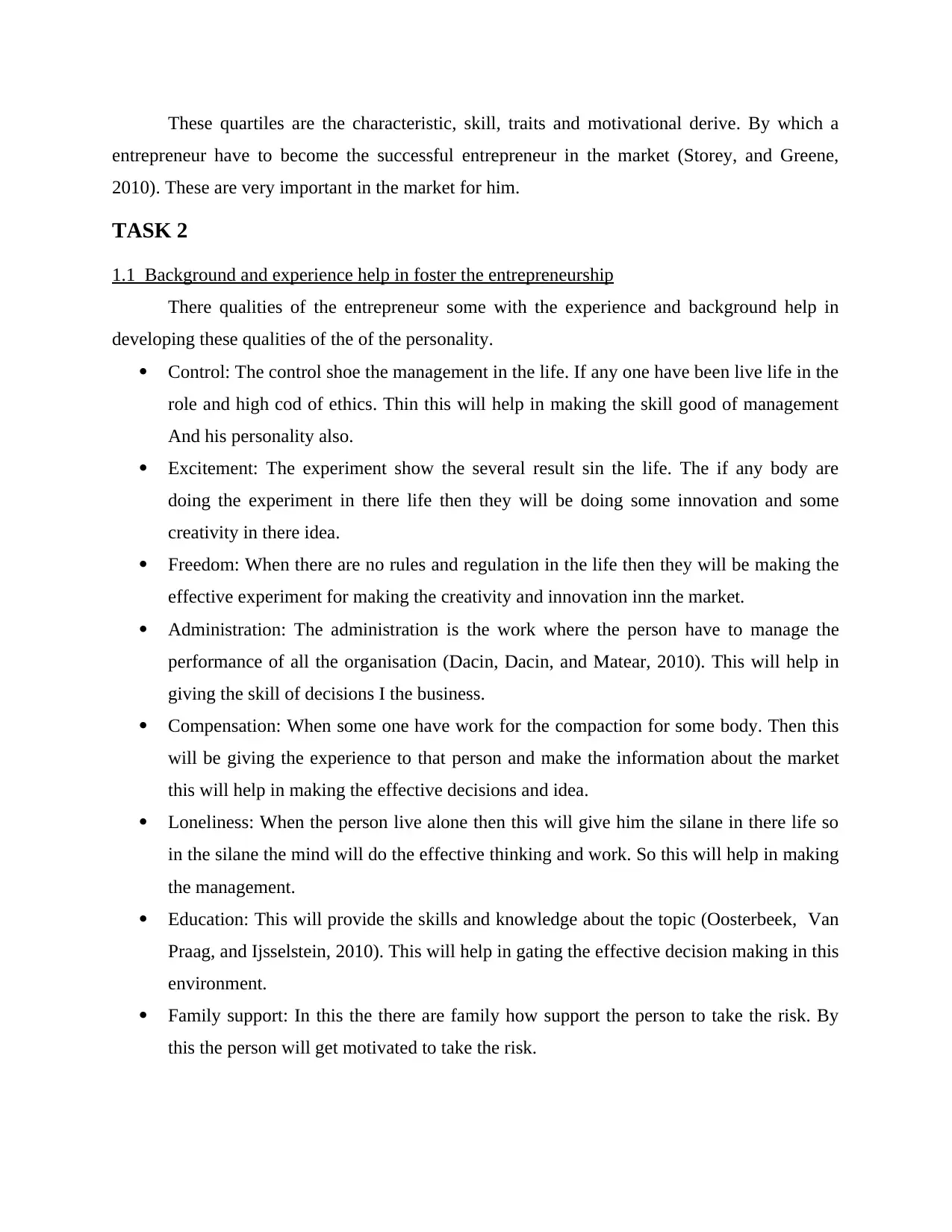
These quartiles are the characteristic, skill, traits and motivational derive. By which a
entrepreneur have to become the successful entrepreneur in the market (Storey, and Greene,
2010). These are very important in the market for him.
TASK 2
1.1 Background and experience help in foster the entrepreneurship
There qualities of the entrepreneur some with the experience and background help in
developing these qualities of the of the personality.
Control: The control shoe the management in the life. If any one have been live life in the
role and high cod of ethics. Thin this will help in making the skill good of management
And his personality also.
Excitement: The experiment show the several result sin the life. The if any body are
doing the experiment in there life then they will be doing some innovation and some
creativity in there idea.
Freedom: When there are no rules and regulation in the life then they will be making the
effective experiment for making the creativity and innovation inn the market.
Administration: The administration is the work where the person have to manage the
performance of all the organisation (Dacin, Dacin, and Matear, 2010). This will help in
giving the skill of decisions I the business.
Compensation: When some one have work for the compaction for some body. Then this
will be giving the experience to that person and make the information about the market
this will help in making the effective decisions and idea.
Loneliness: When the person live alone then this will give him the silane in there life so
in the silane the mind will do the effective thinking and work. So this will help in making
the management.
Education: This will provide the skills and knowledge about the topic (Oosterbeek, Van
Praag, and Ijsselstein, 2010). This will help in gating the effective decision making in this
environment.
Family support: In this the there are family how support the person to take the risk. By
this the person will get motivated to take the risk.
entrepreneur have to become the successful entrepreneur in the market (Storey, and Greene,
2010). These are very important in the market for him.
TASK 2
1.1 Background and experience help in foster the entrepreneurship
There qualities of the entrepreneur some with the experience and background help in
developing these qualities of the of the personality.
Control: The control shoe the management in the life. If any one have been live life in the
role and high cod of ethics. Thin this will help in making the skill good of management
And his personality also.
Excitement: The experiment show the several result sin the life. The if any body are
doing the experiment in there life then they will be doing some innovation and some
creativity in there idea.
Freedom: When there are no rules and regulation in the life then they will be making the
effective experiment for making the creativity and innovation inn the market.
Administration: The administration is the work where the person have to manage the
performance of all the organisation (Dacin, Dacin, and Matear, 2010). This will help in
giving the skill of decisions I the business.
Compensation: When some one have work for the compaction for some body. Then this
will be giving the experience to that person and make the information about the market
this will help in making the effective decisions and idea.
Loneliness: When the person live alone then this will give him the silane in there life so
in the silane the mind will do the effective thinking and work. So this will help in making
the management.
Education: This will provide the skills and knowledge about the topic (Oosterbeek, Van
Praag, and Ijsselstein, 2010). This will help in gating the effective decision making in this
environment.
Family support: In this the there are family how support the person to take the risk. By
this the person will get motivated to take the risk.
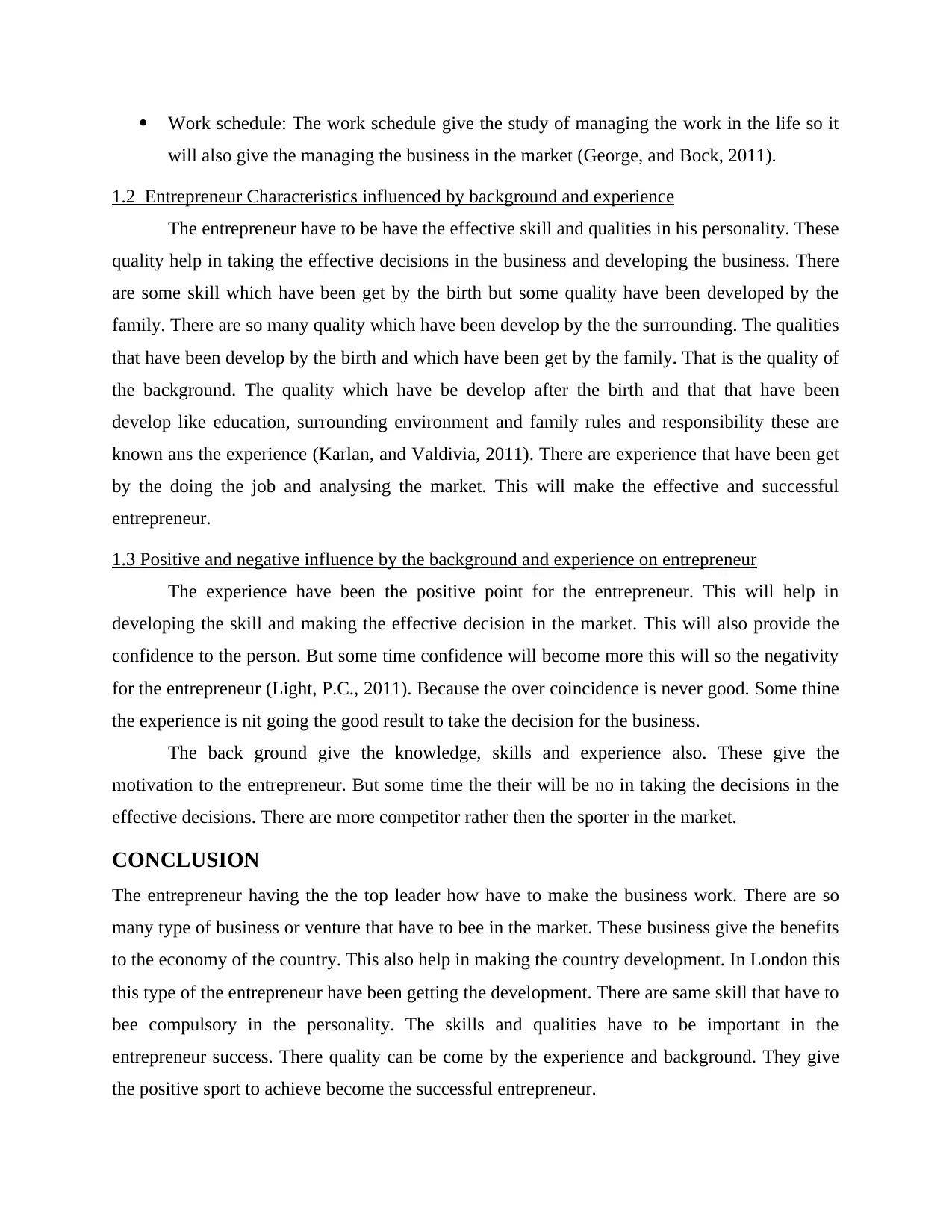
Work schedule: The work schedule give the study of managing the work in the life so it
will also give the managing the business in the market (George, and Bock, 2011).
1.2 Entrepreneur Characteristics influenced by background and experience
The entrepreneur have to be have the effective skill and qualities in his personality. These
quality help in taking the effective decisions in the business and developing the business. There
are some skill which have been get by the birth but some quality have been developed by the
family. There are so many quality which have been develop by the the surrounding. The qualities
that have been develop by the birth and which have been get by the family. That is the quality of
the background. The quality which have be develop after the birth and that that have been
develop like education, surrounding environment and family rules and responsibility these are
known ans the experience (Karlan, and Valdivia, 2011). There are experience that have been get
by the doing the job and analysing the market. This will make the effective and successful
entrepreneur.
1.3 Positive and negative influence by the background and experience on entrepreneur
The experience have been the positive point for the entrepreneur. This will help in
developing the skill and making the effective decision in the market. This will also provide the
confidence to the person. But some time confidence will become more this will so the negativity
for the entrepreneur (Light, P.C., 2011). Because the over coincidence is never good. Some thine
the experience is nit going the good result to take the decision for the business.
The back ground give the knowledge, skills and experience also. These give the
motivation to the entrepreneur. But some time the their will be no in taking the decisions in the
effective decisions. There are more competitor rather then the sporter in the market.
CONCLUSION
The entrepreneur having the the top leader how have to make the business work. There are so
many type of business or venture that have to bee in the market. These business give the benefits
to the economy of the country. This also help in making the country development. In London this
this type of the entrepreneur have been getting the development. There are same skill that have to
bee compulsory in the personality. The skills and qualities have to be important in the
entrepreneur success. There quality can be come by the experience and background. They give
the positive sport to achieve become the successful entrepreneur.
will also give the managing the business in the market (George, and Bock, 2011).
1.2 Entrepreneur Characteristics influenced by background and experience
The entrepreneur have to be have the effective skill and qualities in his personality. These
quality help in taking the effective decisions in the business and developing the business. There
are some skill which have been get by the birth but some quality have been developed by the
family. There are so many quality which have been develop by the the surrounding. The qualities
that have been develop by the birth and which have been get by the family. That is the quality of
the background. The quality which have be develop after the birth and that that have been
develop like education, surrounding environment and family rules and responsibility these are
known ans the experience (Karlan, and Valdivia, 2011). There are experience that have been get
by the doing the job and analysing the market. This will make the effective and successful
entrepreneur.
1.3 Positive and negative influence by the background and experience on entrepreneur
The experience have been the positive point for the entrepreneur. This will help in
developing the skill and making the effective decision in the market. This will also provide the
confidence to the person. But some time confidence will become more this will so the negativity
for the entrepreneur (Light, P.C., 2011). Because the over coincidence is never good. Some thine
the experience is nit going the good result to take the decision for the business.
The back ground give the knowledge, skills and experience also. These give the
motivation to the entrepreneur. But some time the their will be no in taking the decisions in the
effective decisions. There are more competitor rather then the sporter in the market.
CONCLUSION
The entrepreneur having the the top leader how have to make the business work. There are so
many type of business or venture that have to bee in the market. These business give the benefits
to the economy of the country. This also help in making the country development. In London this
this type of the entrepreneur have been getting the development. There are same skill that have to
bee compulsory in the personality. The skills and qualities have to be important in the
entrepreneur success. There quality can be come by the experience and background. They give
the positive sport to achieve become the successful entrepreneur.
⊘ This is a preview!⊘
Do you want full access?
Subscribe today to unlock all pages.

Trusted by 1+ million students worldwide

Paraphrase This Document
Need a fresh take? Get an instant paraphrase of this document with our AI Paraphraser
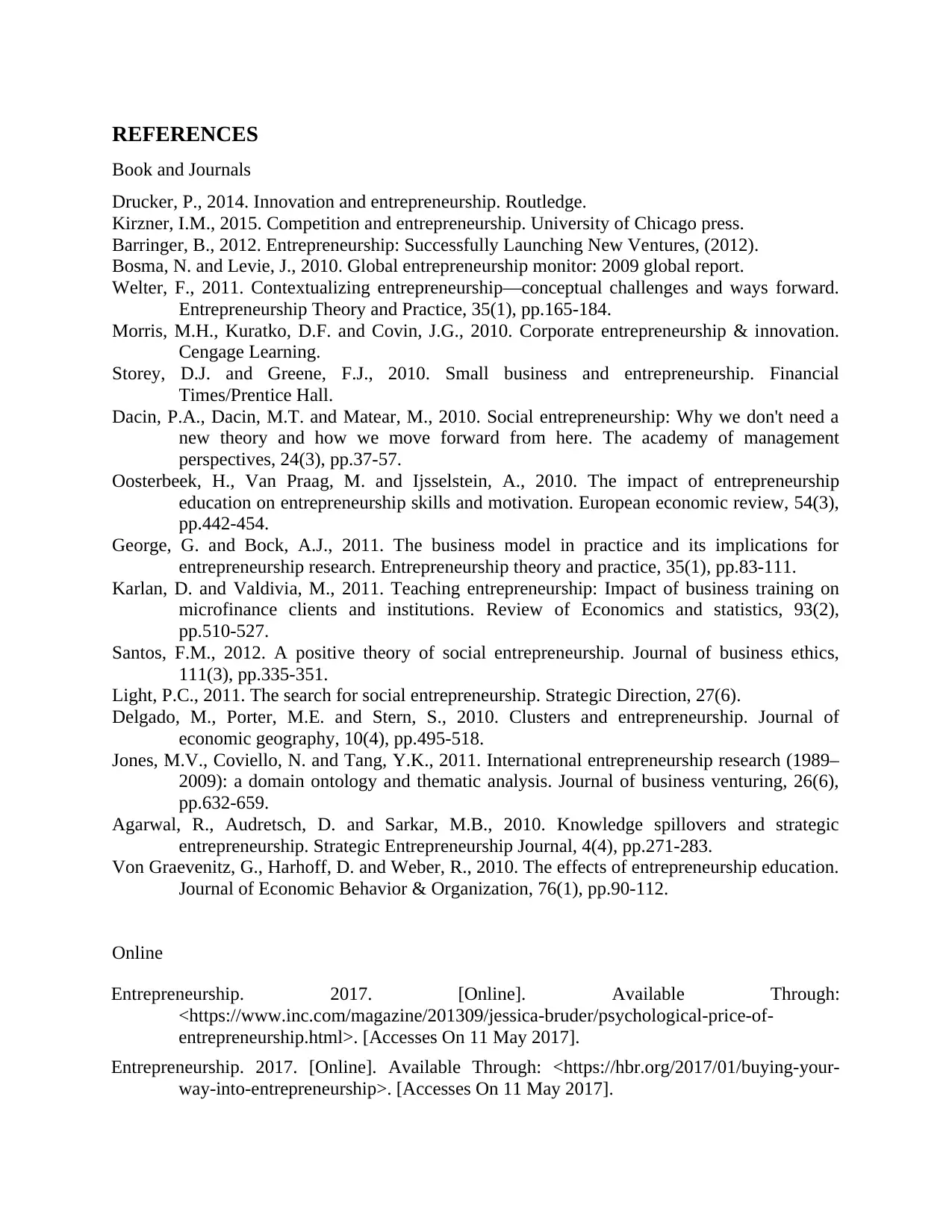
REFERENCES
Book and Journals
Drucker, P., 2014. Innovation and entrepreneurship. Routledge.
Kirzner, I.M., 2015. Competition and entrepreneurship. University of Chicago press.
Barringer, B., 2012. Entrepreneurship: Successfully Launching New Ventures, (2012).
Bosma, N. and Levie, J., 2010. Global entrepreneurship monitor: 2009 global report.
Welter, F., 2011. Contextualizing entrepreneurship—conceptual challenges and ways forward.
Entrepreneurship Theory and Practice, 35(1), pp.165-184.
Morris, M.H., Kuratko, D.F. and Covin, J.G., 2010. Corporate entrepreneurship & innovation.
Cengage Learning.
Storey, D.J. and Greene, F.J., 2010. Small business and entrepreneurship. Financial
Times/Prentice Hall.
Dacin, P.A., Dacin, M.T. and Matear, M., 2010. Social entrepreneurship: Why we don't need a
new theory and how we move forward from here. The academy of management
perspectives, 24(3), pp.37-57.
Oosterbeek, H., Van Praag, M. and Ijsselstein, A., 2010. The impact of entrepreneurship
education on entrepreneurship skills and motivation. European economic review, 54(3),
pp.442-454.
George, G. and Bock, A.J., 2011. The business model in practice and its implications for
entrepreneurship research. Entrepreneurship theory and practice, 35(1), pp.83-111.
Karlan, D. and Valdivia, M., 2011. Teaching entrepreneurship: Impact of business training on
microfinance clients and institutions. Review of Economics and statistics, 93(2),
pp.510-527.
Santos, F.M., 2012. A positive theory of social entrepreneurship. Journal of business ethics,
111(3), pp.335-351.
Light, P.C., 2011. The search for social entrepreneurship. Strategic Direction, 27(6).
Delgado, M., Porter, M.E. and Stern, S., 2010. Clusters and entrepreneurship. Journal of
economic geography, 10(4), pp.495-518.
Jones, M.V., Coviello, N. and Tang, Y.K., 2011. International entrepreneurship research (1989–
2009): a domain ontology and thematic analysis. Journal of business venturing, 26(6),
pp.632-659.
Agarwal, R., Audretsch, D. and Sarkar, M.B., 2010. Knowledge spillovers and strategic
entrepreneurship. Strategic Entrepreneurship Journal, 4(4), pp.271-283.
Von Graevenitz, G., Harhoff, D. and Weber, R., 2010. The effects of entrepreneurship education.
Journal of Economic Behavior & Organization, 76(1), pp.90-112.
Online
Entrepreneurship. 2017. [Online]. Available Through:
<https://www.inc.com/magazine/201309/jessica-bruder/psychological-price-of-
entrepreneurship.html>. [Accesses On 11 May 2017].
Entrepreneurship. 2017. [Online]. Available Through: <https://hbr.org/2017/01/buying-your-
way-into-entrepreneurship>. [Accesses On 11 May 2017].
Book and Journals
Drucker, P., 2014. Innovation and entrepreneurship. Routledge.
Kirzner, I.M., 2015. Competition and entrepreneurship. University of Chicago press.
Barringer, B., 2012. Entrepreneurship: Successfully Launching New Ventures, (2012).
Bosma, N. and Levie, J., 2010. Global entrepreneurship monitor: 2009 global report.
Welter, F., 2011. Contextualizing entrepreneurship—conceptual challenges and ways forward.
Entrepreneurship Theory and Practice, 35(1), pp.165-184.
Morris, M.H., Kuratko, D.F. and Covin, J.G., 2010. Corporate entrepreneurship & innovation.
Cengage Learning.
Storey, D.J. and Greene, F.J., 2010. Small business and entrepreneurship. Financial
Times/Prentice Hall.
Dacin, P.A., Dacin, M.T. and Matear, M., 2010. Social entrepreneurship: Why we don't need a
new theory and how we move forward from here. The academy of management
perspectives, 24(3), pp.37-57.
Oosterbeek, H., Van Praag, M. and Ijsselstein, A., 2010. The impact of entrepreneurship
education on entrepreneurship skills and motivation. European economic review, 54(3),
pp.442-454.
George, G. and Bock, A.J., 2011. The business model in practice and its implications for
entrepreneurship research. Entrepreneurship theory and practice, 35(1), pp.83-111.
Karlan, D. and Valdivia, M., 2011. Teaching entrepreneurship: Impact of business training on
microfinance clients and institutions. Review of Economics and statistics, 93(2),
pp.510-527.
Santos, F.M., 2012. A positive theory of social entrepreneurship. Journal of business ethics,
111(3), pp.335-351.
Light, P.C., 2011. The search for social entrepreneurship. Strategic Direction, 27(6).
Delgado, M., Porter, M.E. and Stern, S., 2010. Clusters and entrepreneurship. Journal of
economic geography, 10(4), pp.495-518.
Jones, M.V., Coviello, N. and Tang, Y.K., 2011. International entrepreneurship research (1989–
2009): a domain ontology and thematic analysis. Journal of business venturing, 26(6),
pp.632-659.
Agarwal, R., Audretsch, D. and Sarkar, M.B., 2010. Knowledge spillovers and strategic
entrepreneurship. Strategic Entrepreneurship Journal, 4(4), pp.271-283.
Von Graevenitz, G., Harhoff, D. and Weber, R., 2010. The effects of entrepreneurship education.
Journal of Economic Behavior & Organization, 76(1), pp.90-112.
Online
Entrepreneurship. 2017. [Online]. Available Through:
<https://www.inc.com/magazine/201309/jessica-bruder/psychological-price-of-
entrepreneurship.html>. [Accesses On 11 May 2017].
Entrepreneurship. 2017. [Online]. Available Through: <https://hbr.org/2017/01/buying-your-
way-into-entrepreneurship>. [Accesses On 11 May 2017].

Entrepreneurship. 2017. [Online]. Available Through: <https://hbr.org/2017/01/buying-your-
way-into-entrepreneurship>. [Accesses On 11 May 2017].
way-into-entrepreneurship>. [Accesses On 11 May 2017].
⊘ This is a preview!⊘
Do you want full access?
Subscribe today to unlock all pages.

Trusted by 1+ million students worldwide
1 out of 9
Related Documents
Your All-in-One AI-Powered Toolkit for Academic Success.
+13062052269
info@desklib.com
Available 24*7 on WhatsApp / Email
![[object Object]](/_next/static/media/star-bottom.7253800d.svg)
Unlock your academic potential
Copyright © 2020–2025 A2Z Services. All Rights Reserved. Developed and managed by ZUCOL.



